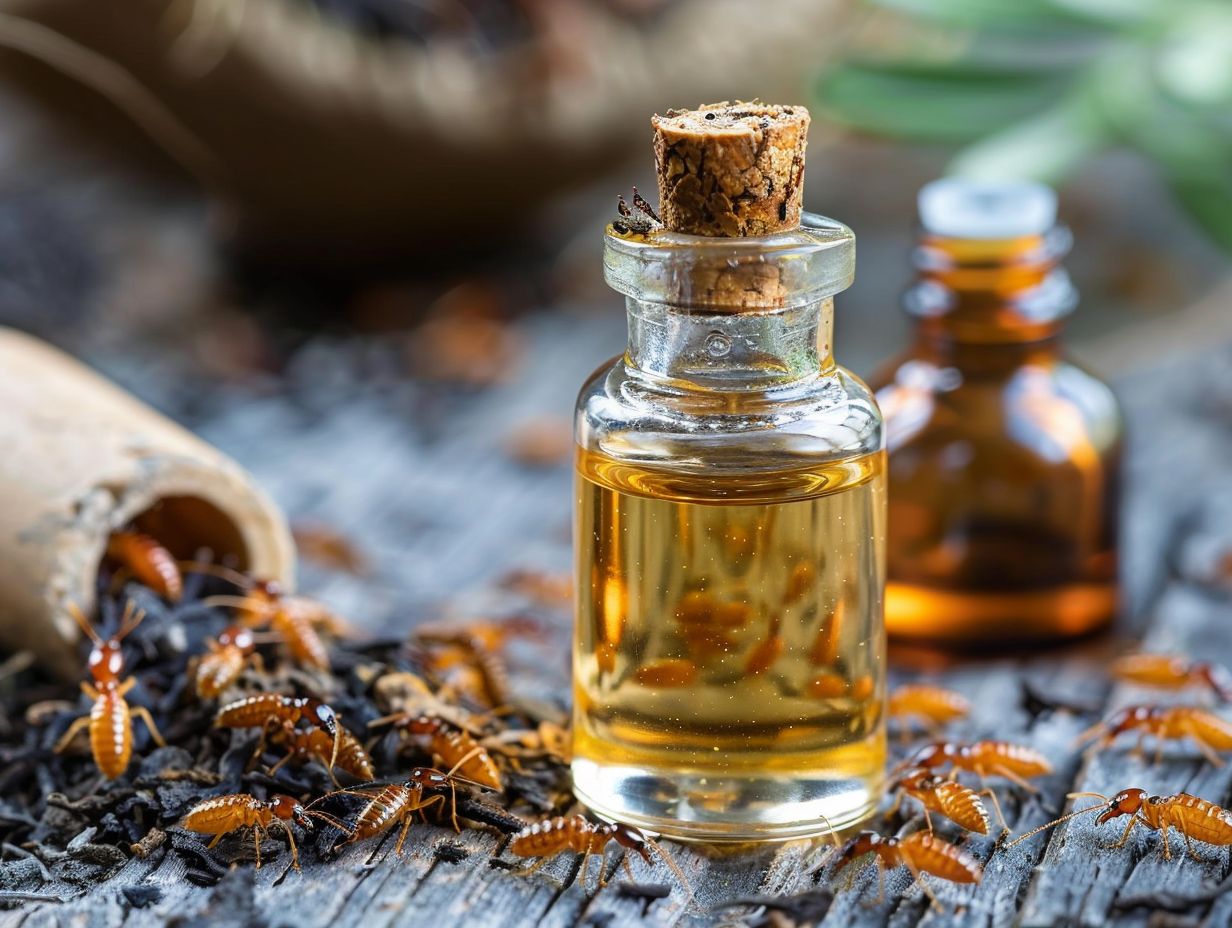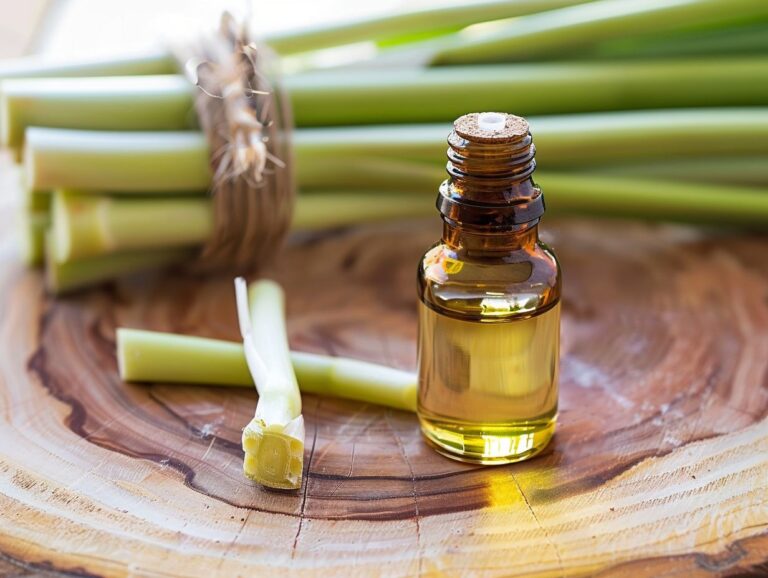Can Essential Oils Kill Termites
Essential oils have been gaining popularity for their various benefits, including their potential to repel and kill pests like termites.
We explore the effectiveness of essential oils against termites, the types of oils that are most effective, and how they work to eradicate these pests.
We discuss the safety of using essential oils, precautions to take, and other methods of termite control.
Learn more about this natural approach to termite extermination.
Key Takeaways:
What Are Essential Oils?
Essential oils are highly concentrated natural extracts obtained from plants, known for their aromatic and therapeutic properties. These oils are commonly used in aromatherapy, skincare, and natural remedies due to their diverse benefits and pleasant fragrances.
Extracting essential oils involves methods such as steam distillation, cold pressing, or solvent extraction, depending on the plant material. For example, lavender oil is often extracted through steam distillation from lavender flowers, preserving its calming aroma. Different oils like peppermint, tea tree, and eucalyptus offer antibacterial, antifungal, and anti-inflammatory properties, making them popular choices for skincare products and disinfectants. The chemical composition of essential oils, including terpenes and phenolics, plays a crucial role in their therapeutic effects, affecting mood, stress levels, and overall well-being.
What Are Termites?
Termites are social insects that live in colonies and feed on wood and plant materials, causing significant damage to structures and homes. Termite infestations can go undetected for long periods, leading to structural integrity issues and costly repairs.
These insects play a crucial role in ecosystems by breaking down dead plant material, aiding in nutrient cycling. Termite colonies consist of different castes, including workers, soldiers, and the reproductive caste. The workers are responsible for foraging food, constructing tunnels, and caring for the young. Soldiers defend the colony from predators and threats.
The most common termite species, like the Eastern Subterranean Termite, create mud tubes for shelter and protection while foraging for food. These species thrive in moist environments and can cause extensive damage by consuming wood silently and rapidly.
Signs of a termite infestation include hollow-sounding wood, discarded wings, mud tubes, and piles of frass near wooden structures. Early detection is crucial to prevent widespread damage.
Can Essential Oils Kill Termites?
Essential oils have shown promise in controlling termites through their natural insecticidal properties and eco-friendly nature. Research has indicated that certain essential oils, such as lavender oil and cedarwood oil, can be effective in repelling and eliminating termites when used correctly.
Studies have demonstrated that the active compounds in essential oils disrupt the termites’ central nervous system, leading to their eventual demise. Moreover, essential oils are a sustainable alternative to chemical pesticides, minimizing the impact on the environment and reducing the risk of harmful residues in the soil and water sources. The use of essential oils in termite control also offers long-term protection, as these natural repellents continue to deter termites even after initial application, providing ongoing defense against infestations.
What Types of Essential Oils are Effective Against Termites?
Several essential oils have demonstrated effectiveness against termites, with lavender oil and cedarwood oil being prominent examples. These oils contain compounds that exhibit insecticidal properties, making them valuable natural alternatives for termite control.
Lavender oil is known for its strong scent and contains high levels of terpene compounds such as linalool and linalyl acetate, which are toxic to termites.
Cedarwood oil, on the other hand, contains sesquiterpenes like cedrol and thujopsene, which disrupt the termites’ neurotransmitter function, leading to their eventual demise.
Research studies have shown that these essential oils can repel and even kill termites upon contact or ingestion, providing long-lasting protection against these destructive pests.
How Do Essential Oils Kill Termites?
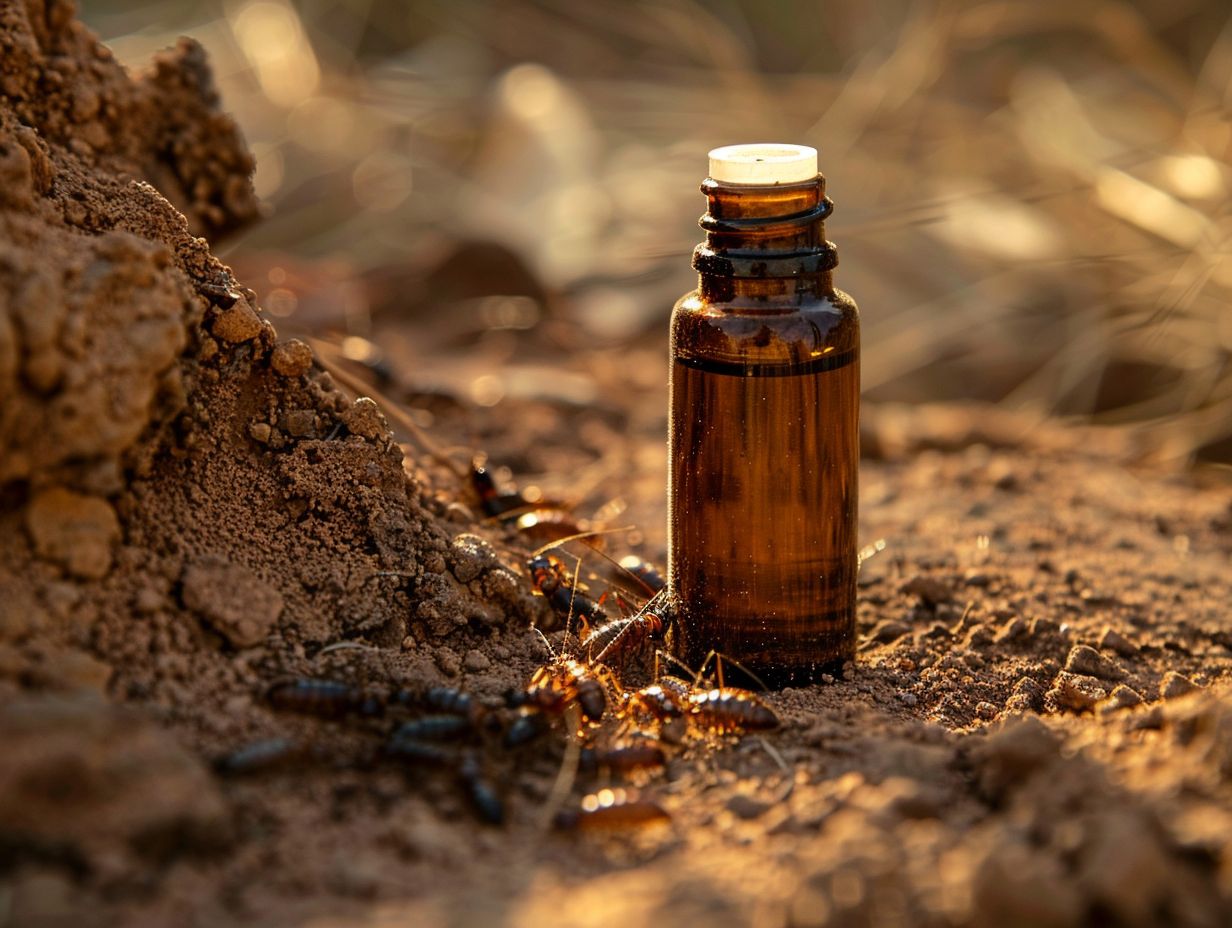
Essential oils kill termites through various mechanisms that target the insects’ nervous system, respiratory system, and exoskeleton. These natural compounds disrupt vital functions in termites, leading to their repulsion, paralysis, or death.
When essential oils are in contact with termites, they can penetrate the insects’ exoskeleton, which is the hard outer shell protecting their bodies. Once inside, these oils can interfere with termites’ neural pathways and disrupt their neurotransmission, causing confusion in communication between their nerve cells.
Some essential oil compounds like citronellol and eugenol can block specific enzyme systems in termites, leading to metabolic dysfunction and eventual death. Others, such as thymol and carvacrol, are known to affect termite respiration by disrupting their oxygen intake and causing suffocation.
The complex blend of volatile compounds present in essential oils creates a potent formula that overwhelms termites’ sensory organs, making them unable to detect danger or locate food sources, ultimately impacting their survival and reproductive cycles.
Disrupting the Termite’s Nervous System
Essential oils disrupt the termite’s nervous system by interfering with neurotransmission processes, leading to neurotoxic effects and behavioral abnormalities.
These neurotoxic effects are primarily attributed to the interactions of the essential oil constituents with the termites’ neuronal targets. For example, compounds like linalool in lavender oil and cedrol in cedarwood oil have been found to bind to specific neurotransmitter receptors in the termite nervous system, disrupting their function.
Certain components of essential oils can inhibit key enzymes involved in synaptic transmission, further impeding the termite’s ability to communicate and coordinate movements. This targeted disruption at a molecular level results in confusion, paralysis, and eventually death among the termite colony members, making essential oils a potent and eco-friendly solution for termite control.
Blocking the Termite’s Respiratory System
Certain essential oils act as termiticide solutions by blocking the respiratory system of termites. Inhalation or contact with these oils can disrupt the oxygen uptake in termites, suffocating them and leading to mortality within the termite colony.
For instance, compounds such as citronellal, eugenol, and thymol found in essential oils like citronella, clove, and thyme respectively have been identified as respiratory inhibitors for termites. When termites come into contact with these compounds, they target the respiratory pathways of the insects, leading to a blockage in the breathing process.
This interruption in respiration causes respiratory distress in termites, ultimately resulting in their demise. These essential oil-based solutions offer an environmentally friendly approach to termite control, as they specifically target the termites’ respiratory systems, reducing the need for harsh chemical pesticides.
Dissolving the Termite’s Exoskeleton
In laboratory testing, some essential oils have demonstrated the ability to dissolve the termite’s exoskeleton or cuticle. This disruptive action compromises the termites’ protective outer layer, leading to dehydration, desiccation, and eventual mortality.
When these essential oils come into contact with the termite’s exoskeleton, they disrupt the protective waxy layer, causing damage to the cuticular structure. This results in increased permeability of the exoskeleton, making it prone to dehydration, which is crucial for the survival of the termite.
The altered cuticular structure affects the water retention capacity of the termites, further exacerbating their vulnerability to desiccation. The combination of these effects contributes to the insecticidal activity of the essential oils, making them potent agents for long-term termite control.
Are Essential Oils Safe to Use Against Termites?
Essential oils are generally considered safe for use against termites, offering an eco-friendly and non-toxic alternative to chemical pesticides.
Homeowners can find relief in the fact that essential oils have low toxicity levels, posing minimal risk to family members, pets, and the environment. This natural solution stands in stark contrast to traditional termiticides, which often contain harsh chemicals that can be harmful to humans and animals. Essential oils are biodegradable, breaking down easily without leaving harmful residues that can linger in the soil or water systems. Their eco-friendly nature makes them a sustainable and environmentally conscious choice for termite control in residential settings.
What Precautions Should Be Taken When Using Essential Oils Against Termites?
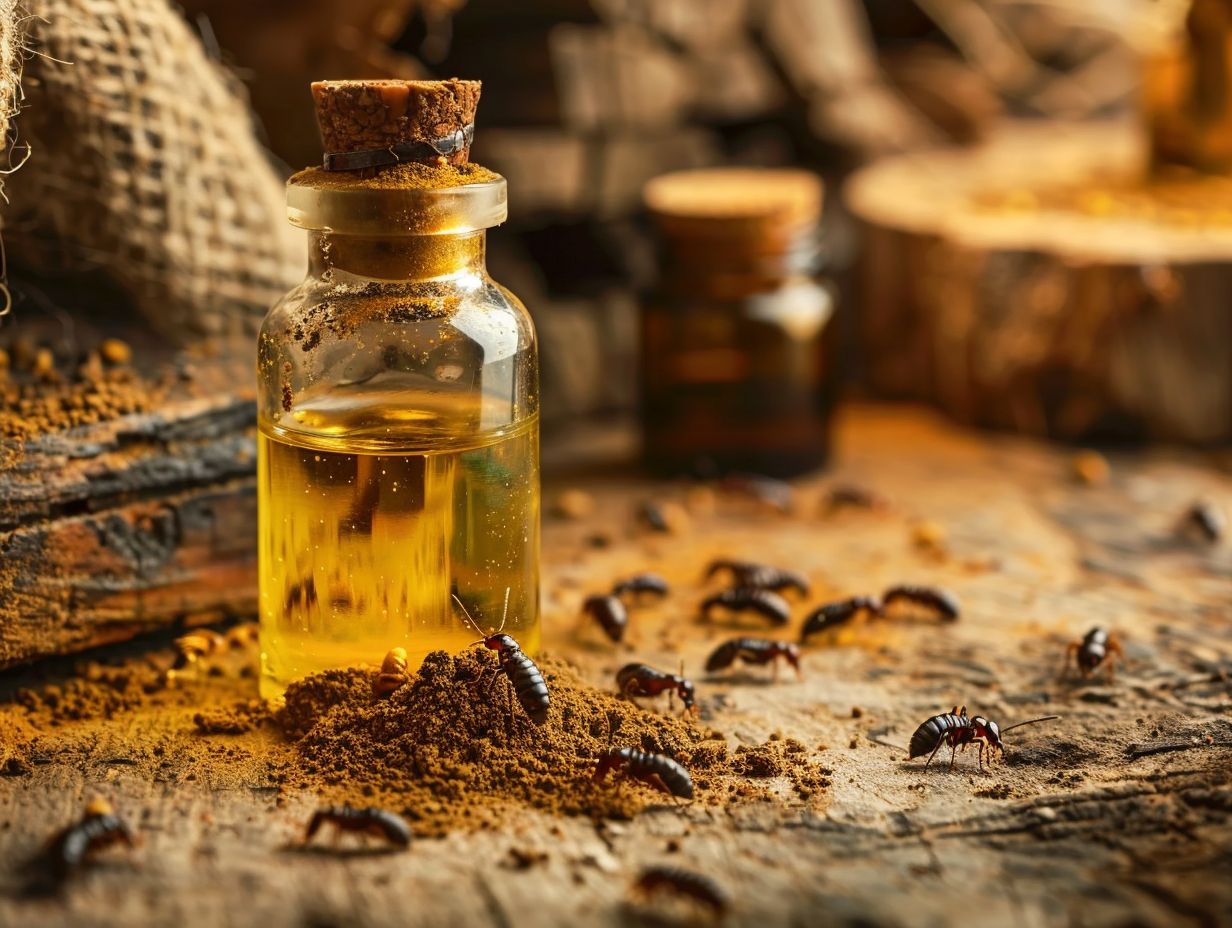
Proper dilution techniques are crucial when using essential oils for termite management. A general rule of thumb is to mix 1-2% essential oil concentration in a carrier substance such as water or a neutral oil. This ensures that the oil is potent enough to repel termites without posing a risk of irritation or harm.
Targeted application areas are key in directing the oils towards termite colonies or areas of infestation. Focus on entry points, cracks, and crevices where termites are likely to dwell, ensuring a more effective treatment.
- Be mindful of potential allergic reactions or sensitivities, especially when using concentrated essential oils. Always perform a patch test on a small area of skin before applying the oil in larger quantities.
What Are the Other Methods of Termite Control?
Along with essential oils, termite control can be achieved through various methods such as chemical pesticides, natural remedies, and professional extermination services. Each approach offers unique benefits and considerations for effectively managing termite infestations.
Chemical pesticides are a common and effective method for termite control, providing quick results and thorough elimination of termites. However, they pose potential risks to humans and the environment due to their toxic nature.
On the other hand, natural remedies like diatomaceous earth or neem oil offer eco-friendly alternatives that can be safer for households with children or pets.
Seeking professional pest control services is advisable for severe termite infestations, as trained experts can assess the extent of the problem and implement targeted solutions. Professional extermination guarantees long-term protection against termite damage and ensures thorough eradication, preventing future reinfestations.”
Chemical Pesticides
Chemical pesticides are commonly used to eliminate termite colonies and prevent further damage to wooden structures. These potent compounds act as termiticides by disrupting the insects’ physiological functions, ultimately eradicating the infestation and protecting the property.
The active ingredients in these chemical pesticides, such as imidacloprid or fipronil, target termites when applied either directly to the affected area or as a barrier treatment around the building’s foundation. Once termites come into contact with the pesticide, it interferes with their nervous system, leading to paralysis and eventual death. One of the advantages of using chemical pesticides is their residual effect, which continues to protect against termite reinfestation for an extended period.
Natural Remedies
Natural remedies offer eco-friendly alternatives to chemical pesticides for termite control, utilizing substances like neem oil and diatomaceous earth. These natural products disrupt termite activity through non-toxic mechanisms, providing sustainable solutions for pest management.
Neem oil, extracted from the seeds of the neem tree, contains compounds that repel termites and interfere with their ability to molt, disrupting their life cycle. On the other hand, diatomaceous earth, a powder made from fossilized algae, dehydrates insects upon contact, effectively eliminating them.
While these natural remedies are effective, it’s important to consider factors like application frequency, coverage area, and the severity of the infestation when opting for natural termite control methods. Using eco-friendly solutions not only protects the environment but also safeguards human and pet health from harmful chemical exposure.
Professional Extermination
Professional extermination services offer comprehensive solutions for termite infestations, combining inspection, treatment, and prevention strategies to safeguard wooden structures. Experienced pest control professionals can assess the extent of termite damage and implement targeted extermination measures.
These experts utilize a range of specialized tools, such as moisture meters and termite baits, to detect and exterminate termites efficiently. They apply insecticide treatments to eliminate active infestations and prevent future ones. Proper sealing of entry points and installing termite barriers are crucial steps in their preventive approach to protect homes and buildings.
Regular inspections and maintenance are recommended to ensure long-term termite control and early detection of any potential new infestations. Pest control professionals can provide tailored advice on precautionary measures and wood treatments to minimize termite risks.
Conclusion
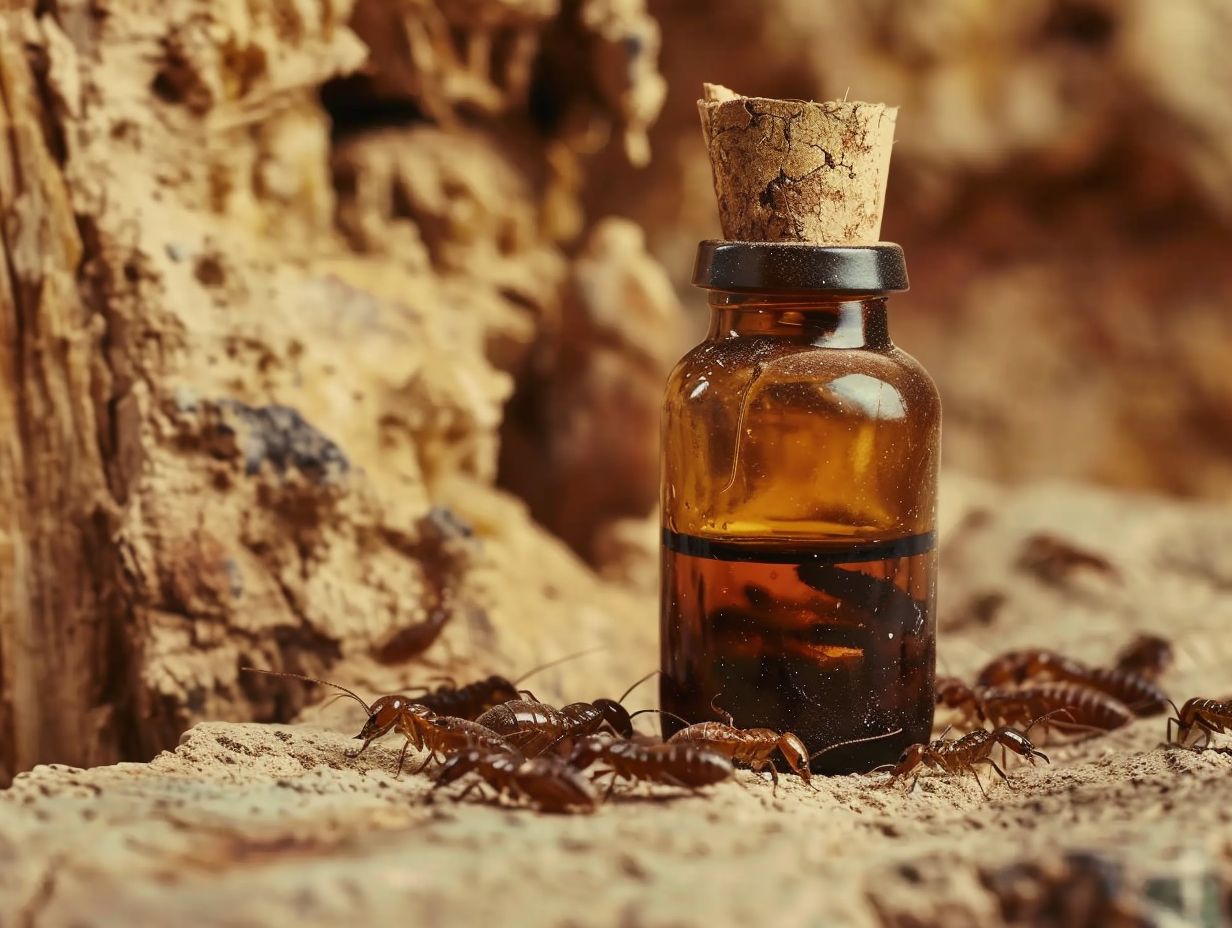
The use of essential oils, such as lavender essential oil, presents a promising and eco-friendly approach to termite control that can help safeguard wooden structures and homes. Through research on the insecticidal activity of essential oils and their environmental benefits, homeowners have access to effective alternatives for protecting their properties.
Studies have shown that lavender essential oil exhibits strong repellent properties against termites, disrupting their feeding and communication patterns within colonies. This natural solution not only deters termites from infesting wood but also inhibits their ability to cause structural damage over time. The efficiency of lavender essential oil lies in its ability to target termites without posing harm to humans, pets, or the environment, making it a safe and sustainable choice for termite management.
Frequently Asked Questions
Can essential oils kill termites?
Yes, certain essential oils have been proven to be effective in killing termites.
Which essential oils are known to kill termites?
Clove, thyme, peppermint, and vetiver essential oils are known to have termite-killing properties.
How do essential oils kill termites?
Essential oils contain compounds that are toxic to termites, causing paralysis and ultimately death.
Are essential oils safe to use for termite control?
Yes, essential oils are a natural and non-toxic alternative to chemical pesticides, making them safe for use in termite control.
Do essential oils have any other benefits when it comes to termites?
Aside from killing termites, some essential oils also have repellent properties, helping to prevent future infestations.
How do I use essential oils to kill termites?
Essential oils can be mixed with water and sprayed directly onto termite-infested areas, or used in a diffuser to fumigate an entire room.

